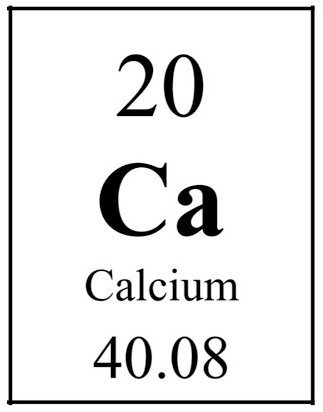Calcium
Longevity Benefits
- Supports DNA repair.

Quantity of ingredient in each package
Method of consumption, and precautions
Production process and inspection.
Calcium. We know it's important for strong bones, but did you know this essential mineral plays a crucial role in a wide range of bodily functions, including longevity?
Beyond Bones: Calcium's Impact on Longevity
While strong bones are undoubtedly essential, calcium's influence on longevity extends far beyond skeletal health:
- Cellular Signaling: Calcium acts as a vital messenger within cells, regulating various cellular processes, including muscle contractions, nerve impulses, and hormone release.
- Hormone Regulation: Calcium plays a crucial role in the proper functioning of the endocrine system, influencing the production and release of hormones like parathyroid hormone (PTH), which regulates calcium levels in the blood.
- Mitochondrial Function: Calcium plays a key role in maintaining healthy mitochondrial function. Mitochondria are the "powerhouses" of our cells, responsible for producing energy.
- Inflammation Control: Calcium helps regulate immune function and may play a role in reducing chronic inflammation, a major contributor to age-related diseases.
- Calcium Deficiency: A Hidden Threat to Longevity
Calcium deficiency can have significant impacts on overall health and longevity:
- Increased risk of fractures: Weakened bones increase the risk of fractures, particularly in older adults.
- Muscle weakness and fatigue: Calcium deficiency can impair muscle function, leading to weakness and fatigue.
- Weakened immune system: Calcium plays a vital role in immune function, and deficiency can increase susceptibility to infections.
- Increased risk of chronic diseases: Studies have linked calcium deficiency to an increased risk of chronic diseases such as cardiovascular disease and type 2 diabetes.
Supporting Longevity with Optimal Calcium Intake
- Dietary Sources: Include calcium-rich foods in your diet, such as dairy products (milk, yogurt, cheese), leafy green vegetables (kale, spinach), almonds, and fortified foods (plant-based milk, orange juice).
- Supplementation: Consider a high-quality calcium supplement, especially if you have difficulty meeting your daily calcium needs through diet alone.
Lifestyle Factors:
- Regular Exercise: Weight-bearing exercises such as walking, jogging, and weightlifting help maintain bone density.
- Vitamin D: Vitamin D is essential for calcium absorption. Ensure you get adequate Vitamin D through sun exposure or supplementation.
Choose the Right Calcium Supplement
When selecting a calcium supplement, look for:
- High bioavailability: Choose a form of calcium that is easily absorbed by the body (e.g., calcium citrate).
- Appropriate dosage: Consult with a healthcare professional to determine the appropriate dosage for your individual needs.
- Other essential nutrients: Consider supplements that also contain vitamin D and magnesium, which work synergistically with calcium.
Beyond Bones: Calcium's Impact on Longevity
While strong bones are undoubtedly essential, calcium's influence on longevity extends far beyond skeletal health:
- Cellular Signaling: Calcium acts as a vital messenger within cells, regulating various cellular processes, including muscle contractions, nerve impulses, and hormone release.
- Hormone Regulation: Calcium plays a crucial role in the proper functioning of the endocrine system, influencing the production and release of hormones like parathyroid hormone (PTH), which regulates calcium levels in the blood.
- Mitochondrial Function: Calcium plays a key role in maintaining healthy mitochondrial function. Mitochondria are the "powerhouses" of our cells, responsible for producing energy.
- Inflammation Control: Calcium helps regulate immune function and may play a role in reducing chronic inflammation, a major contributor to age-related diseases.
- Calcium Deficiency: A Hidden Threat to Longevity
Calcium deficiency can have significant impacts on overall health and longevity:
- Increased risk of fractures: Weakened bones increase the risk of fractures, particularly in older adults.
- Muscle weakness and fatigue: Calcium deficiency can impair muscle function, leading to weakness and fatigue.
- Weakened immune system: Calcium plays a vital role in immune function, and deficiency can increase susceptibility to infections.
- Increased risk of chronic diseases: Studies have linked calcium deficiency to an increased risk of chronic diseases such as cardiovascular disease and type 2 diabetes.
Supporting Longevity with Optimal Calcium Intake
- Dietary Sources: Include calcium-rich foods in your diet, such as dairy products (milk, yogurt, cheese), leafy green vegetables (kale, spinach), almonds, and fortified foods (plant-based milk, orange juice).
- Supplementation: Consider a high-quality calcium supplement, especially if you have difficulty meeting your daily calcium needs through diet alone.
Lifestyle Factors:
- Regular Exercise: Weight-bearing exercises such as walking, jogging, and weightlifting help maintain bone density.
- Vitamin D: Vitamin D is essential for calcium absorption. Ensure you get adequate Vitamin D through sun exposure or supplementation.
Choose the Right Calcium Supplement
When selecting a calcium supplement, look for:
- High bioavailability: Choose a form of calcium that is easily absorbed by the body (e.g., calcium citrate).
- Appropriate dosage: Consult with a healthcare professional to determine the appropriate dosage for your individual needs.
- Other essential nutrients: Consider supplements that also contain vitamin D and magnesium, which work synergistically with calcium.
